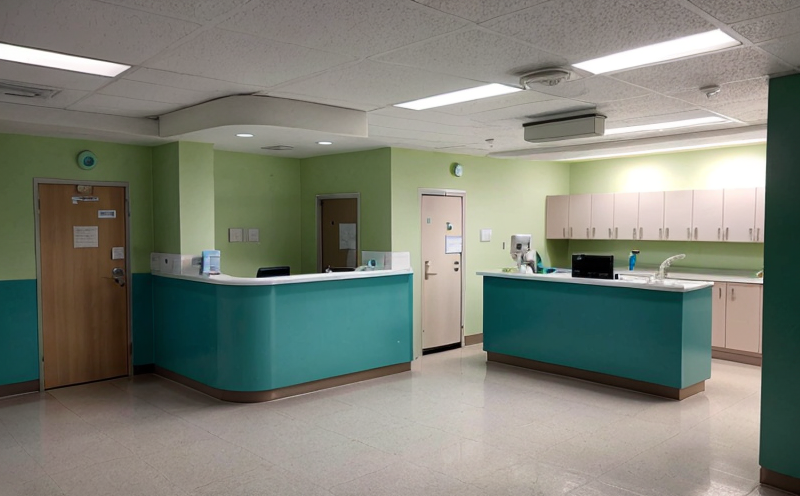ISO 18415 Detection of Spoilage Microorganisms in Healthcare Surfaces
The implementation of ISO 18415 is crucial for ensuring the cleanliness and safety of healthcare environments. This internationally recognized standard provides a robust framework for detecting spoilage microorganisms that can compromise patient care, staff health, and overall hygiene standards within hospitals and other healthcare facilities.
ISO 18415 focuses on the detection of microorganisms such as bacteria, fungi, and viruses that may lead to cross-contamination or infection. The standard outlines comprehensive methods for sampling surfaces in healthcare environments, including patient rooms, operating theaters, intensive care units (ICUs), and other areas where hygiene is paramount.
The testing process involves the use of advanced microbiological techniques that ensure accurate detection of spoilage microorganisms. This includes the isolation and identification of potentially harmful microorganisms using culture-dependent and culture-independent methods. Culture-dependent methods rely on traditional growth-based techniques, while culture-independent methods utilize molecular biology approaches such as polymerase chain reaction (PCR) to detect target organisms.
Once samples are collected from surfaces, they undergo rigorous analysis in our ISO-certified laboratories. Our state-of-the-art facilities employ cutting-edge equipment and methodologies that adhere strictly to the guidelines set forth by ISO 18415. This ensures that every test is conducted with precision and meets international standards for reliability and accuracy.
Our services go beyond mere detection; we also provide detailed reports that outline our findings, including species identification, concentration levels, and any potential risks associated with the detected microorganisms. These insights are invaluable for healthcare facilities looking to maintain optimal hygiene standards and prevent outbreaks of infectious diseases.
We understand the importance of timely results in maintaining a safe environment for patients and staff. Our dedicated team works diligently to ensure that samples are processed promptly, delivering reliable reports within industry-standard timelines. By adhering strictly to ISO 18415 guidelines, we provide healthcare facilities with actionable data that can inform corrective actions and enhance overall infection control efforts.
The implications of detecting spoilage microorganisms in healthcare settings cannot be overstated. Cross-contamination events not only jeopardize patient recovery but also lead to increased costs due to prolonged hospital stays, additional treatments, and potential legal liabilities. By leveraging ISO 18415-compliant testing services, healthcare facilities can proactively manage these risks.
In conclusion, the implementation of ISO 18415 in healthcare environments is essential for maintaining hygiene standards that protect both patients and staff. Our laboratory offers a comprehensive suite of services designed to help healthcare providers meet these stringent requirements, ensuring a safer environment through thorough and reliable microbiological testing.
Scope and Methodology
The scope of ISO 18415 covers the detection of spoilage microorganisms on surfaces in healthcare environments. This includes various types of surfaces such as floors, walls, medical equipment, and patient belongings that come into contact with patients.
Our methodology for detecting these microorganisms follows a structured approach:
- Surface Sampling: We use standardized swabbing techniques to collect samples from designated areas. These sampling methods are designed to ensure representative coverage of the surface being tested.
- Sample Preparation: Once collected, the samples undergo thorough preparation steps that include homogenization and dilution to enhance detection sensitivity.
- Detection Techniques: Our laboratories employ a range of advanced microbiological techniques. These include culture-based methods which rely on incubation and observation for growth, as well as culture-independent methods utilizing molecular biology tools like PCR for rapid and accurate detection.
- Analysis and Reporting: After the samples are processed, our team conducts detailed analysis to identify the presence of specific microorganisms. Results are then compiled into comprehensive reports that provide actionable insights for healthcare facilities.
Environmental and Sustainability Contributions
The implementation of ISO 18415 in healthcare settings has significant environmental and sustainability benefits. By ensuring the cleanliness of surfaces, these tests help reduce the spread of infectious diseases, thereby decreasing the need for extensive medical interventions. This not only improves patient outcomes but also reduces the burden on healthcare resources.
Moreover, the accurate detection and control of spoilage microorganisms can lead to more efficient use of cleaning products and supplies. This efficiency contributes to a reduction in waste generation and overall resource consumption within healthcare facilities. By adhering strictly to ISO 18415 guidelines, we help promote sustainable practices that align with broader environmental goals.
The detailed insights provided by our testing services enable healthcare providers to implement targeted cleaning protocols that are both effective and environmentally friendly. This approach minimizes unnecessary chemical usage while maintaining high hygiene standards. Our commitment to sustainability is reflected in the use of eco-friendly materials and processes wherever possible, further enhancing our positive environmental impact.
In summary, ISO 18415-compliant testing services play a crucial role in supporting sustainable healthcare practices by fostering an environment that is both safe and resource-efficient. Through meticulous analysis and reporting, we help facilities make informed decisions that contribute to long-term sustainability goals.
Use Cases and Application Examples
The application of ISO 18415 in healthcare settings is diverse and covers various critical areas:
- New Facility Commissioning: Before a new healthcare facility opens, it undergoes thorough testing to ensure all surfaces are free from spoilage microorganisms. This helps establish baseline hygiene standards against which future performance can be measured.
- Outbreak Investigations: In the event of an outbreak or suspected contamination, ISO 18415-compliant tests provide critical data that can help identify and contain the source of infection. This enables healthcare providers to implement targeted interventions promptly.
- Regular Monitoring: Continuous monitoring using ISO 18415 ensures ongoing compliance with hygiene standards. This helps maintain consistent cleanliness levels across all areas of a facility, reducing the risk of cross-contamination.
- Infection Control Programs: By integrating ISO 18415 into their infection control programs, healthcare facilities can identify and address potential threats early on. This proactive approach contributes to improved patient care and reduced hospital-acquired infections (HAIs).





